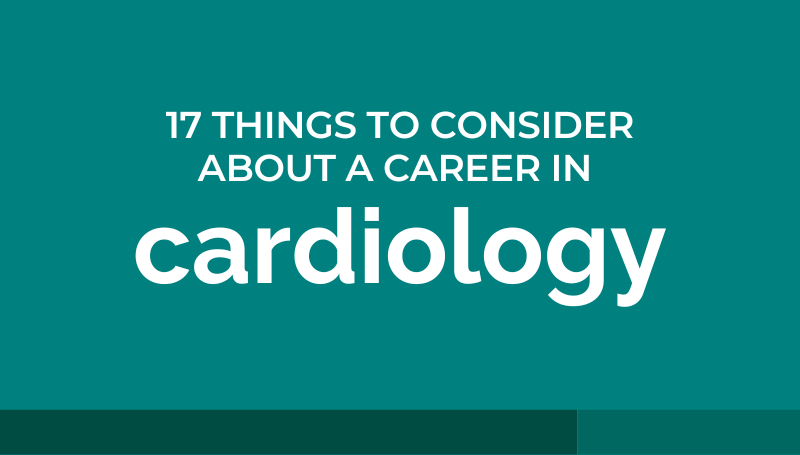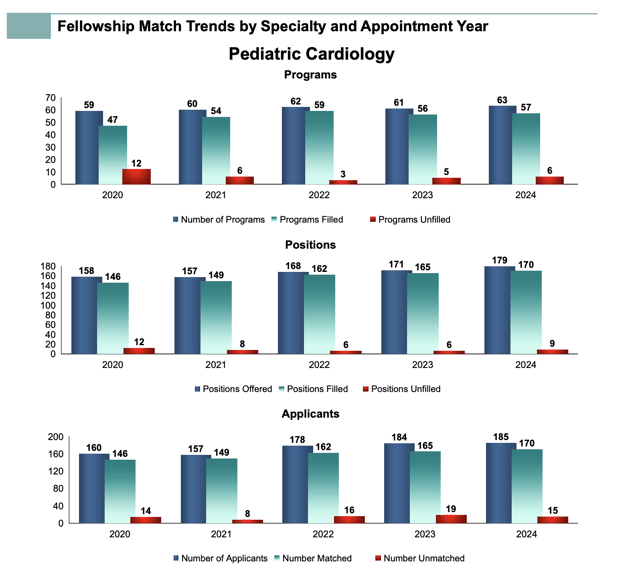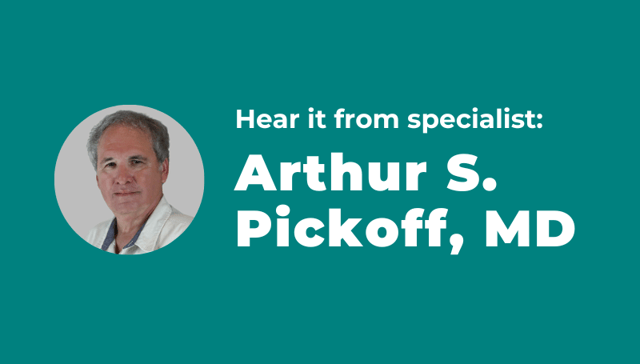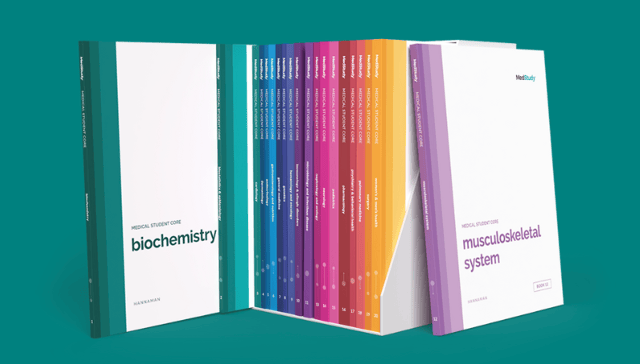How to become a cardiologist: 21 insights into the cardiologist career path

Looking to make a significant impact in the medical field? Cardiology might be a good option for you! It offers a blend of challenge, reward, and the potential to transform lives. This comprehensive guide delves into the essentials of taking on a cardiologist career path, addressing common FAQs, like:
- "How long does it take to become a cardiologist?",
- "How long is cardiology fellowship?",
- "How competitive is cardiology fellowship?",
- "How much do cardiologists make?", and so much more!
And, if you stick around to the end, we've done an interview with Arthur S. Pickoff, MD about his career and insights for future cardiologists, you don't want to miss it.
Read the full interview with Dr. Pickoff in the Cardiology Medical Student Core book.
What does a cardiologist do?
Both adult and pediatric cardiologists diagnose and treat disorders of the heart and blood vessels. Conditions treated by adult cardiologists include ischemic heart disease and myocardial infarction (which represent a large portion of the adult cardiologist practice), heart failure, cardiomyopathy, acquired conditions such as myocarditis, and a host of rhythm disturbances, with atrial fibrillation being the most common.
What do pediatric cardiologists do?
The spectrum of disorders treated by pediatric cardiologists is somewhat different. The pediatric cardiologist rarely sees ischemic heart disease or myocardial infarction. Instead, a pediatric cardiologist often evaluates and treats neonates, infants, and children with congenital heart disease, including septal defects (such as ventricular septal defects), cyanotic heart disease (such as tetralogy of Fallot), and obstructive lesions (such as coarctation of the aorta). Like adult cardiologists, pediatric cardiologists diagnose and treat patients with heart failure, cardiomyopathies, certain acquired heart conditions (such as rheumatic fever), and cardiac rhythm disturbances.
In general, pediatric cardiologists care for patients from prenatal life to 21 years of age, and adult cardiologists care for patients from age 21 and beyond. There is an interesting and relatively new field that has evolved called adults with congenital heart disease, in which both adult and pediatric cardiologists often provide care side by side.
What cardiology subspecialties are there?
Within both adult and pediatric cardiology there are cardiologists who subspecialize in various fields within cardiology. Some examples of subspecialties of cardiology include: interventional cardiologists, cardiac electrophysiologists, preventive cardiologists, and other cardiologists who specialize in cardiac imaging, including echocardiography and cardiac MRI.
Subspecialties of cardiology:
- Interventional cardiologists employ sophisticated tools in the cardiac catheterization laboratory to open and stent blocked coronary arteries (adult cardiology), to use balloon catheters to open up stenotic, narrowed pulmonary and aortic valves (pediatric cardiology), and even implant artificial cardiac valves without the need for surgery.
- Cardiac electrophysiologists place specialized electrode catheters within the heart to determine the mechanism of a cardiac rhythm disturbance and use specialized catheters to burn or freeze critical areas of the heart that are responsible for the abnormal rhythm. They also implant pacemakers in patients with severe bradycardias and, when necessary, automatic internal cardioverters/defibrillators in patients at risk for severe ventricular arrhythmias.
- Preventive cardiology, exists within both adult and pediatric cardiology and aims to prevent or mitigate the development of severe atherosclerotic heart disease through various interventions, including diet, exercise, and the pharmacologic treatment of hyperlipidemias.
How to become a cardiologist
Becoming a cardiologist requires an undergraduate degree, going to medical school, doing a residency in internal medicine, pediatrics, or med-peds, going through a fellowship program, and those interested in subspecializing will have additional training.
How long does it take to become a cardiologist?
It will take about 10 to 11 years after you receive your undergraduate degree to become a cardiologist, and could take longer if you wish to subspecialize further. After completing medical school, a physician will go into residency in internal medicine, pediatrics or med-peds. Those interested in becoming a cardiologist enter a fellowship training program, and after fellowship, those interested in one of the subspecialties (e.g., interventional cardiology, electrophysiology) often complete additional specialized training.
How many years does it take to become a cardiologist?
Altogether, including your undergraduate degree, it could take 15 years to become a cardiologist and more if you choose to subspecialize.
- 4 years to receive an undergraduate degree: A strong foundation in sciences is recommended. We'll go into this more below!
- 4 years of medical school: Typically a 4-year commitment where one earns an MD or DO degree.
- 3-4 years in residency training: in either
- internal medicine (3 years),
- pediatrics (3 years),
- or a med-peds (4 years) residency, laying the groundwork for specialization.
- 3 years in a cardiology or pediatric cardiology fellowship: An additional 3 years focusing on cardiology fellowship training to become a general adult or pediatric cardiologist.
- 1-2 years to subspecialize: The length may vary depending on subspecialty.
What's the best pre med major?
There is no right answer to this question, as we've seen success in medical school and beyond from a wide range of undergraduate degrees, but the most common are received in biology, chemistry, or biochemistry. Regardless of your major, make sure you're completing your pre-medical requirements, which may vary by school, but typically include: biology with lab, chemistry with lab (both general and organic), physics with lab, biochemistry, math courses, and english. Medical schools also often value coursework in genetics and psychology.
How long is cardiology fellowship?
After your 3-4 years in residency training in either internal medicine (3 years), pediatrics (3 years), or a med-peds (4 years) residency, those interested in cardiology will need to be accepted and complete a cardiology fellowship program. The cardiology fellowship length generally consists of 3 years of training.
How competitive is cardiology fellowship?
Cardiology is considered one of the more competitive medical fellowships to enter with only about 1,199 available fellowship positions, but lots of interest in the field. With a limited number of fellowship positions available each year, the demand for those spots make it a competitive specialty. Typically programs look for candidates who excel academically, have high test scores, excellent clinical performance during residency, and may value other achievements like publications or leadership roles.
How competitive is pediatric cardiology fellowship?
Pediatric cardiology fellowship is also highly competitive, similar to adult cardiology, but with its unique set of challenges and demands. As a subspecialty within pediatrics focused on diagnosing and treating heart conditions in infants, children, and adolescents, pediatric cardiology attracts applicants passionate about both pediatrics and cardiology. Below is the NRMP's fellowship Match trends for pediatric cardiology from 2024.
NRMP results and data specialties matching service, 2024 appointment year
Cardiology fellowship salary
According to Salary.com, the average cardiologist fellow salary in the United States is $133,202, with that being said, the salary range can vary greatly depending on the program, location, and what year you are in your fellowship. Most programs have their salary listed on their website for each year of your fellowship and also list their benefits. We recommend taking a look at those and the cost of living where the program is located to help make your decision of where to apply.
How many hours does a cardiology fellow work?
Again, the amount of hours you'll work as a cardiology fellow varies greatly depending on the program you're at as well as if you are subspecializing. Some programs will push you close to the 80 hour limit, whereas other programs report fellows working 45-55 hours a week, spaced between clinical days, hospital days, on call days, and occasional weekends.
Cardiologist education requirements
Board-certified cardiologists have to complete many steps before they are eligible to take their licensing exams, and have to complete continuing medical education requirements and maintenance of certification requirements after their residency and fellowship years. The educational requirements to becoming a cardiologist and maintaining your board-certified status include:
- Complete an undergraduate degree and pre-medical requirements
- Prepare for and take the MCAT
- Get accepted and graduate from medical school
- Take and pass licensing exams - USMLE and/or COMLEX exams
- Match with and graduate from an IM, Peds, or Med-Peds residency
- Match with and graduate from a cardiology fellowship training program
- Optional routes to subspecialize through further fellowships
- Pass your boards and state licensing exams
- Complete your continuing medical education requirements and maintenance of certification requirements based on your employer and state regulations.
How much do cardiologists make a year?
According to Salary.com the average cardiologist - non-invasive salary in the United States is $431,000, but the range typically falls between $349,400 and $521,800. This can vary based on your educational background, how much experience you have, and if you've done further specialty training.
Is it hard to become a cardiologist?
Becoming a cardiologist is undeniably challenging with the rigorous academic and clinical training required (including medical school, residency, and fellowship), as well as the length of the training programs (typically 4 years of medical school, 3 years of residency, and 3 years of fellowship, with options to subspecialize further), it takes a dedicated person who is willing to take on these challenges.
The emotional resilience required to deal with the highs and lows of studying, taking exams, and patient care, particularly in a field as critical as heart health, adds another layer of difficulty. But, for those with a passion for making a difference in patients' lives and a fascination with cardiology topics, the challenge of becoming a cardiologist can be overcome and can be deeply fulfilling, you can read more about this in our interview with a cardiologist below!
How many hours does a cardiologist work?
The number of hours you'll work as a cardiologist varies widely based on your work setting. For example, if you're a hospital-based cardiologist, you may work longer or more irregular hours, including nights and weekends, due to the need to respond to emergency situations. If you're working in private practice you may have more control over your schedule or work regular business hours, however, you may still be needed for emergencies.
Subspecialization within cardiology can also influence working hours. For example, interventional cardiologists and electrophysiologists may have more unpredictable schedules due to emergency procedures, while those focusing on non-invasive cardiology might have more regular hours.Do cardiologists do surgery?
It's important to distinguish interventional cardiologists from cardiothoracic surgeons, who are the medical professionals who perform open-heart surgery and other major heart-related operations. Cardiologists do not perform these surgeries. Cardiologists primarily focus on diagnosing and treating heart and blood vessel conditions using a combination of medications, lifestyle adjustments, and non-surgical procedures. Some cardiologists, particularly those specialized in interventional cardiology, do perform minimally invasive surgical procedures.
Is cardiology a good career?
Cardiology is often considered a highly rewarding and respected career within the medical field for several reasons, though it does come with its challenges! Whether cardiology is a good career for you depends on your interests, values, and willingness to commit to the demanding training and work schedule. Here are some factors to consider:
Pros:
- Impact on your patients: Cardiologists have a significant impact on patients' lives, often treating complex conditions. The ability to improve or even save a patient's life provides immense professional and personal satisfaction.
- Financial Rewards: Cardiologists are among the higher-earning professionals in the healthcare sector, reflecting the years of training and the complexity of the work involved. The financial compensation can be substantial, especially for those in specialized or high-demand areas.
- Diverse specializations: The field of cardiology includes various subspecialties mentioned earlier. This diversity allows cardiologists to focus on areas that match their interests and skills.
Disadvantages of being a cardiologist
Cardiology can be an incredibly fulfilling career for those passionate about it, can offer the chance to make a profound difference in patients' lives, and you can earn a rewarding income. However, it's essential to weigh these benefits against the challenges of stress, training duration, and potential impacts on personal life.
Cons:
- Lengthy and demanding training: The path to becoming a cardiologist involves many years of education and training mentioned earlier, this can be a significant commitment.
- High-stress environment: The nature of the work can be stressful, dealing with critically ill patients, making life-saving decisions, and sometimes working long or irregular hours. Achieving a balance between personal life and the demanding schedule of a cardiologist can be challenging, especially in the early years of practice or in highly specialized roles.
- Emotional toll: The field can be emotionally challenging, particularly when dealing with severe illnesses, patient deaths, or complex decisions.
Are cardiologists happy?
One study found that 83% of cardiologists reported feeling satisfied or very satisfied about their career, another found that most cardiologists are happy with their earnings and salary. However, another study of interventional cardiologists found that 69% of survey participants stated that burnout impacted their life and 64% said they were emotionally exhausted.
Interview with a cardiologist: Dr. Pickoff
We interviewed Dr. Pickoff about his career as a Cardiologist
Read the full interview with Dr. Pickoff in the Cardiology Medical Student Core book.
We had the privilege of speaking with Dr. Arthur S. Pickoff, a pediatric cardiologist, who shared his insights and personal journey in the field of cardiology. Here's what he had to say about his career, the challenges he's faced, and his advice for aspiring physicians.
What is your specialty and why did you choose it?
"I am a board-certified pediatrician and pediatric cardiologist. I really wanted to be involved in the care of children as the focus of my professional life. Then the question became, do you want to be a general pediatrician or a subspecialist? I decided to become a subspecialist and took several electives in the 4th year of medical school in various pediatric subspecialties. It was during my pediatric cardiology elective that I felt a true connection and 'fit' with this specialty. I liked the focus of the specialty, the tools used to diagnose children with heart disease, and the various treatment strategies. I liked that as a pediatric cardiologist you can spend time in the clinic, time in the hospital and ICU, time performing invasive cardiac procedures, and time performing noninvasive imaging studies."
What do you like best about your specialty?
"Helping neonates, infants, and children with suspected or known heart disease is the absolute best part of being a pediatric cardiologist! And to be clear, we are now able to help, even cure, the vast majority of even the most severe forms of congenital or acquired heart disease. When I was a pediatric intern, there was nothing that could be offered to babies with a severe form of left heart obstruction called hypoplastic left heart syndrome. In today’s world, there are a number of options available to help palliate these babies, including performing a series of surgical procedures (the Norwood procedure) and even cardiac transplantation. I still, now and then, get cards from patients I treated for this disorder, who are now entering college, the job market, or getting married. It is very gratifying!"
What do you dislike the most about your specialty?
"Honestly, the only 'downside' to this specialty is the fact that while we can help the vast majority of our patients navigate through a difficult cardiac condition, not everyone survives or survives without a significant disability. So, the specialty can be sad at times. But the community of pediatric cardiologists is committed to continually improving the care provided to children with congenital and acquired heart disease."
Stress is a huge issue for doctors. Do you have any suggestions for how I can develop better resiliency to career-related stress?
"You must work hard but also play hard. Don’t bring work-related stress home with you. Cultivate a network of friends, in addition to family, with whom you can openly discuss issues such as work-related stress. And here is another little trick that I have told countless residents who are about to embark on their career: Choose the type of practice you are going to enter carefully. For example, increasingly, many physicians are employed by a hospital or hospital system. In this setting, the stress of many administrative hassles, such as billing and collecting, compliance, etc. is done by others, not you. Also consider the size of the group you are joining. If you are signing onto a job to be the 2nd pediatric cardiologist in a practice, you will be on call every other weekend! On the other hand, if you are coming on as the 8th pediatric cardiologist, it is likely that your on-call duty will be much less, perhaps even once every month or so. Choose wisely."
Medical Student Core books
Each of the Medical Student Core books features a Career Focus section at the beginning of each topic. These sections present an overview of the specialty, as well as an interview with a specialist, that paint a clear picture of what your future holds should you venture down that path.
Start studying with the Medical Student Study Strong System now or try just the Medical Student Core Cardiology book to see the entire Cardiology Career Focus section. This comprehensive learning system combines focused content with evidence-based learning techniques to ensure you truly LEARN the foundations of medicine as you work toward your goal of becoming an awesomely competent doctor, no matter what specialty you choose.
Interested in reading about careers in other specialties?
Read these interviews with other physician specialists who dish on the deets of their careers:
|
Primary care: |
Specialties: |





